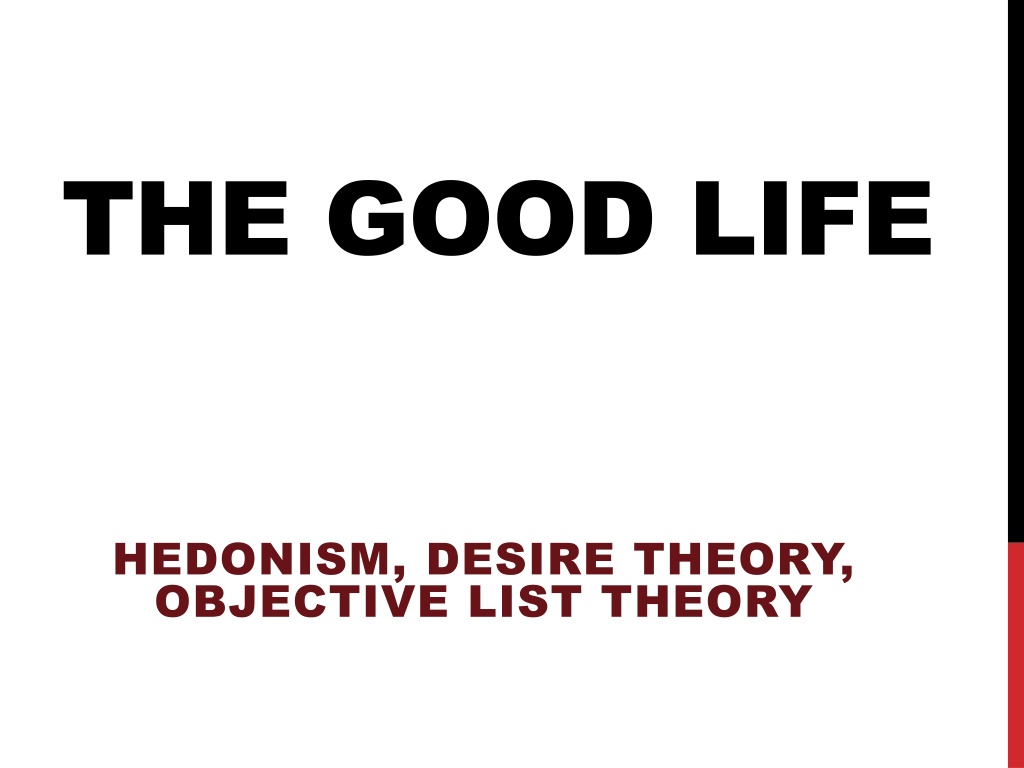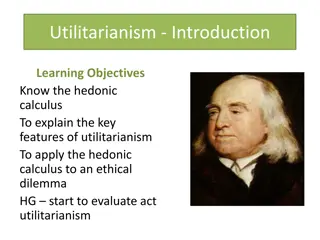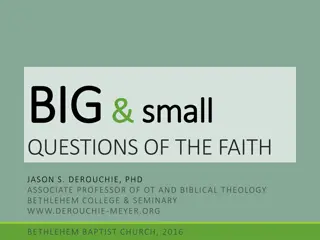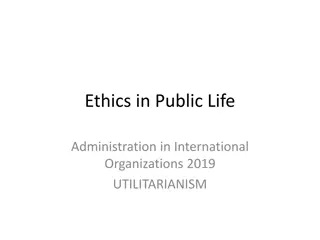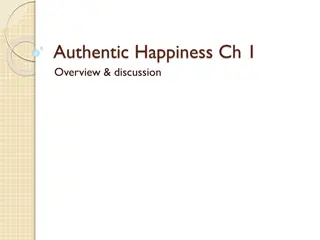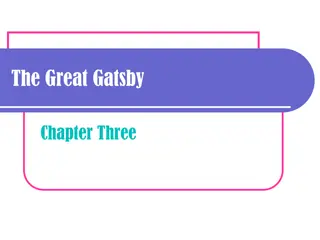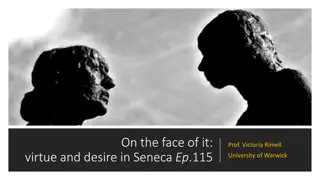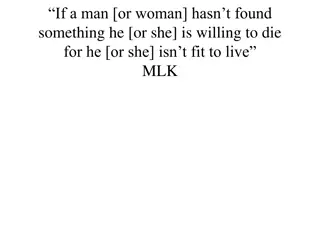Exploring The Good Life: Hedonism, Desire Theory, and Objective List Theory
Delve into the concepts of Hedonism, Desire Theory, and Objective List Theory to understand what constitutes a good life and the pursuit of well-being. Explore different value theories, the debate between subjective and objective values, and the philosophical perspectives on happiness and pleasure. Reflect on the psychological and ethical aspects of seeking pleasure and the distinction between individualistic and universalistic approaches to Hedonism.
Download Presentation

Please find below an Image/Link to download the presentation.
The content on the website is provided AS IS for your information and personal use only. It may not be sold, licensed, or shared on other websites without obtaining consent from the author. Download presentation by click this link. If you encounter any issues during the download, it is possible that the publisher has removed the file from their server.
E N D
Presentation Transcript
THE GOOD LIFE HEDONISM, DESIRE THEORY, OBJECTIVE LIST THEORY
If you are like me, you spent a fair amount of time thinking about how your life can go better. Good or bad, one s life can always be better. In order to know how life can be better, we first need to know how it can be good. We need a standard to determine the level of well-being or well- fair.
Many things can improve life: Money Friends Success Food Sports Education Power Sex Notoriety Clothes Art Love Pizza Health Vaccinations IPhone 11 Instrumental good: Pursued for the sake of its consequences. Intrinsically good: Pursued for its own sake.
IS THERE AN ULTIMATE GOOD? What is the ultimate good? We need to know what things make life good by their presence alone (if there are such things).
DIFFERENT VALUE THEORIES There are subjective and objective value theories. Subjective argue that what makes our life better is (or are) things that satisfy us. Objective argue that there are things that make our life better no matter what we think.
HEDONISM Many people believe a good life is a happy life. This means happiness is a sufficient and a necessary condition for a good life. On this view, anything else, money, pizza, fame, big house, is valuable only to the extent that it makes you happy. This view is called hedonism. The term comes from the Greek word h don , meaning pleasure.
HEDONISM: PSYCHOLOGICAL OR ETHICAL Psychological: humans seek pleasure in everything they do. (Self-sacrifice in the end is just done for personal benefit) Many argue from psychological hedonism to ethical hedonism: that is, because humans seek pleasure, seeking pleasure is morally good and required.
INDIVIDUALISTIC VS. UNIVERSALISTIC Individualistic Hedonism Originally proposed by ancient Greek philosophers Aristippus (435-356 BCE) and Epicurus (371-270 BCE) vs.
Aristippus: we ought to pursue pleasure. Everything that increases the amount of pleasure is good. Short episodes of intense pleasure. Pleasure is the only thing worth pursuing. The moral good has nothing to do with the recollection of past enjoyments or with the hope of new ones. Epicurus: happiness is the result of moderation in all physical matters, and intellectual clarity about what s really important in life.
UNIVERSALISTIC Jeremy Bentham (1748-1832) He did not make a distinction between kinds of pleasures.
Whats fundamentally valuable and what ultimately motivates us is pleasure and pain. Happiness is a matter of experiencing pleasure and lack of pain. Bentham admits: no direct proof of such an analysis of human motivation though it is clear that, in acting, all people implicitly refer to it.
IN INTRODUCTION TO THE PRINCIPLES OF MORALS AND LEGISLATION, BENTHAM WRITES Nature has placed mankind under the governance of two sovereign masters, pain and pleasure. It is for them alone to point out what we ought to do, as well as to determine what we shall do They govern us in all we do, in all we say, in all we think: every effort we can make to throw off our subjection, will serve but to demonstrate and confirm it. (Ch. 1)
JOHN STUART MILL (1806-1873) J. S. Mill. (Student of Bentham): Critics accused him of proposing a doctrine of the swine : hedonism is concerned only about animalistic pleasure. Mill responded that his critics don t realize that human beings unlike animals are capable of higher pleasures.
There are two kinds of pleasure: (1) Physical (2) Psychological (enjoyment). Physical pleasure is the kind one gets from sex or eating pizza. It is temporary happiness. These feelings are not the same as happiness. Universalistic Hedonism is interested in attitudinal pleasure the positive attitude of enjoyment. Enjoyment rather than physical pleasure is the key to a good life. Hedonism defines good life as one full of sustained enjoyment, a life containing no sadness or misery.
CONSEQUENTLY Enjoyment (happiness) is the ultimate good it is intrinsically good. Happiness isn't like eating pizza or having money. It is valuable in itself. Pizza and money are instrumentally good. But, happiness is intrinsically good because you desire it for its own sake. Think about it. Why do you want to be happy?
HIGHER VS. LOWER PLEASURE Higher pleasures hard work, especially intellectual work: writing a book, building an airplane, studying, and more. They are worth pursuing and lead to higher pleasure. Proof: those who experience both always prefer the intellectual pleasures to the physical pleasures. Think about it: would you be interested in being turned into a pig with the prospect of having unconditional pig pleasure? Or would you prefer to be a human though not as happy as the pig? As Mill puts it, it is better to be a human being dissatisfied than a pig satisfied. It is better to be Socrates dissatisfied than a fool satisfied.
Mill argued that pleasure is the only thing that is always worth pursuing for its own sake. Happiness is the ultimate good. Happiness means pleasure and the absence of pain. What evidence does Mill have that pleasure is the ultimate good? questions of ultimate ends do not admit of proof. It is a first principle known a priori. It is obvious. Proof of this is that everything you pursue is for pleasure (happiness). But if I ask you why do you pursue happiness, you cannot answer that in terms of something else. Happiness is the end of the explanation. It is the thing for which all other things are pursued.
No more proof can be given after that. Think about it: each person desires his own happiness. You know that you want happiness because it is good and it is for every person. So, general happiness is aggregate good. Hedonism seems right everyone wants to be happy. Is this a good argument?
Some philosophers (Plato, 427-347 and Aristotle, 384-322) argued that philosophical contemplation is the key to a good life. Hedonism is attractive because it allows that the best activity for human beings is one that brings happiness. There activities can be different. One interesting implication of hedonism is that even if you deny that happiness is good for you, and in fact you think that your life is not better off being happy, hedonism says that you are wrong.
Hedonism makes sense, right? Because unhappiness really makes life worse off. A miserable person can have many things, money, cars, love, but without enjoyment, his or her life is not good. Imagine two individuals leading identical lives. But one of them enjoys his life while the other hates it. If you were to choose, which life would you choose? In fact happiness is what we want for our loved ones. We all want our children to be happy.
PROBLEMS? But, is happiness the only element that makes a life good? According to hedonism, yes. Think about this: if happiness is all that matters, the only thing that makes a life good, then why don t we get a lobotomy? Hedonists respond that once lobotomized you would not have autonomy. But then is it autonomy the ultimate good, or happiness?
TWO WORLDS Imagine two worlds: they contain identical amounts of happiness and misery. In one, the people are all virtuous; in the other, they are vicious. Hedonism tells us that the two worlds are equally good! Hard to believe! Hedonism responds: Virtuous people make others happy; so this scenario is impossible to imagine. Fair enough. So imagine that in the virtuous world, people are sick (or something else that would bring down the amount of happiness). Still, the virtuous world clearly is better than the vicious. Consequently, more than happiness is needed for a good life.
ARGUMENT 1. If hedonism is true, then two identical situations containing identical amounts of happiness and misery are equally good. 2. Premise one is demonstrably false. 3. Therefore, hedonism is false. Sure hedonists can always say that their view is that happiness makes the life of a person good, but not a world or a situation.
PARADOX OF HEDONISM 1. If happiness is the only thing that makes life good, then it is rational to pursue it. 2. It isn t rational to do it. 3. Therefore, happiness is not the only thing that makes us happy.
EVIL PLEASURE 1. If hedonism is true, then happiness attained through evil is as good as any. 2. 1. is false. 3. Therefore, hedonism is false.
FALSE HAPPINESS 1. If hedonism is true, our lives go well to the extent that we are happy, even false happiness. 2. But people whose happiness is based on deception have worse lives than those whose happiness is based on true beliefs. 3. Therefore, hedonism is false.
LIFE TRAJECTORY 1. If hedonism is true, a good life depends on the quantity of happiness. 2. But a life that begins well and goes downhill cannot be better than a life that begins badly and improves even if there is no difference in the total amount of happiness. 3. Therefore, hedonism is false.
THE EXPERIENCE MACHINE The thought experiment Nozick asks us to imagine a machine that could give us whatever desirable or pleasurable experiences we could want. If given the choice would we prefer the machine to real life?
EXPERIENCE MACHINE OR NOT? Nozick believes that if pleasure were the only intrinsic value, people would have a prevailing reason to be hooked up to an experience machine. According to Nozick, you would not want to be hooked up to the experience machine. Why?
THE ARGUMENT 1. If experiencing as much pleasure as we can is all that matters to us, then if we will experience more pleasure by doing x than by doing y, we have no reason not to do x rather than y. 2: We will experience more pleasure if we plug into the experience machine than if we do not plug into the experience machine. C1: If all that matters to us is that we experience as much pleasure as we can, then we have no reason not to plug into the experience machine. P3: We have reason not to plug into the experience machine. C2: Experiencing as much pleasure as we can is not all that matters to us.
REASONS NOT TO PLUG IN Nozick provides us with three reasons not to plug into the machine. 1. We want to do certain things, and not just have the experience of doing them. It is only because we first want to do the actions that we want the experiences of doing them. 2. We want to be a certain sort of person. Someone floating in a tank is an indeterminate blob. 3. Plugging into an experience machine limits us to a man-made reality (it limits us to what we can make). There is no actual contact with any deeper reality, though the experience of it can be simulated.
THE DESIRE THEORY Hedonism proposes that happiness is an objective good. Chris Heatwood proposes a subjective theory, the so- called Desire Theory: Our lives go well when and only when we have an interest in [something] or want it or have some other positive attitude toward it (or it causes us to get something else that we have or will have a positive attitude towards).
HOW QUALITY OF LIFE IMPROVES Charlie wants to improve his quality of life. He read in a philosophy book a list of things that are said to improve one s life, e.g., friendship, food, gym membership He tries, but he doesn t get happy! According to Heatwood, what improves your life is what YOU want. Ted Bundy wanted to torture, rape, and murder his victims. He was evil. But if you ask what made him happy it is obvious, rape, killing, torturing. Would Bundy s life better off not be doing those things (before he was captured and executed)?
WHAT BENEFITS LIFE? All we are saying is that Bundy benefitted, for a time, from his lifestyle. (Heatwood) How do you define Benefitting? Eating mud and thinking you re eating chocolate cake? Getting AIDS and thinking you re getting rewarded? Being deluded improves your life? How do you define life? Is life only a few years? Life means lifetime.
Whenever what a person wants to be the case is the case (in fact), this constitutes a benefit for the person. Joe wants the case to be that he jumps off the top floor of the Empire State building. Suppose it is in fact the case. How does this constitute a benefit for Joe? Wherever a person s desires are frustrated this constitutes a basic harm. What if I frustrate Joe s jumping off the building. Later on he regains his wits and thanks me. He goes to grad school, gets a master s degree in business, opens a business gets married and is very happy as a result. Did I frustrate Joe s desires? Is his life better?
Making money, freedom, love, etc. can make our lives better but only by being things we want. But what about Joe? He wanted to die. How does death make your life better? What about pleasure and happiness? According with the desire theory, pleasure/happiness are not good in themselves for anyone. Imagine a creature who s completely indifferent to this feeling, or even finds it unbearable. (Can you imagine that?)
A person benefits from pleasure/happiness only in case he desires them. What if Joe inherits a large sum? He did not desire it, but if Joe is like me, he will greatly benefit from something he did not originally desire. Consequently this counterexample seems to undermine the desire theory.
Some proponents revise the desire theory such that what determines our welfare is our idealized desirer. Heatwood argues against idealized desire because idealized is no longer subjective! I want to eat a pie that is poisoned Heatwood argues that is not a problem because I do benefit from having the pie but I benefit more from not being sick. The theory accommodates this.
OBJECTIVE LIST THEORY The Objective List Theory (List Theory) agrees with hedonism that pleasure is an objective element of wellbeing. But the List argues there are other things that make life better. Typical candidates are Autonomy, pleasure, knowledge of important matters, friendship, significant achievements.
Accordingly, a life full of pleasure can be of low quality because it lacks Autonomy, pleasure, knowledge of important matters, friendship, significant achievements. Those elements are intrinsically good and make your life better whether you like it or not. Their values cannot be reduced to the amount of pleasure they generate. What s the evidence? Imagine two identical situations. One has less of an element than in the other situation. What is the explanation? If you are better off, then that element is an element of well-being.
NIHILISM AND RELATIVISM NIHILISM AND RELATIVISM
MORAL RELATIVISM: MORALITY IS MORAL RELATIVISM: MORALITY IS RELATIVE TO A CULTURE RELATIVE TO A CULTURE Principle of tolerance: tolerate other culture No culture is better or worse No culture is morally superior to any other Criticism: If tolerance is to be accepted as an objective value, then relativism is false. Response: the principle of tolerance is also relative. A tolerant act is moral in reference to a culture that agrees with it/immoral in reference to another that disagrees with it.
Universal moral rules There are no objective, ultimate moral rules or values. Criticism: Virtually all cultures value altruism, and disapprove unnecessary and gratuitous suffering. Response: It is possible that all cultures in the world jointly endorse such values; but it doesn t follow such values are objective.
Hitler was right? Accordingly, no one is ultimately right or wrong, but relatively so. Thus, Hitler was right. Criticism: how can we plausibly believe that Hitler was right? Response: Hitler was right depending on the moral framework from which we evaluate his actions.
Social reformers Are social reformers right in their efforts to change the status quo? Criticism: relativism implies anti slavery, anti racism reformers were wrong. This is absurd. Response: Moral reformers are right and wrong depending on the moral frame of reference from which we evaluate them.
Moral Progress Is moral progress possible? Criticism: moral progress is possible. Moral progress implies moving toward an ideal standard of morality. Therefore, relativism is false. Response: Moral progress is relative. We say that equality is better than slavery because we judge from our present frame of reference.
An act can be right and wrong at the same time? Criticism: nothing can be and not be at the same time! Response: morality is like motion. A body is both at rest and in motion depending on which frame of reference we measure its state.
The concept of culture is vague? According to relativism, morality is relative to a culture. Criticism: What is a culture? How many people is a culture? You belong to many overlapping cultures. Relativism is false. Response: Any number of people is sufficient.
NIHILISM Nihilism: (nihil = nothing ). There aren t any objective moral facts or subjective. 2 forms of nihilism: Error theory & Expressivism.
